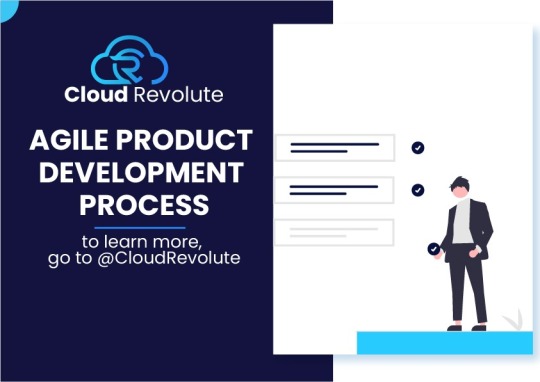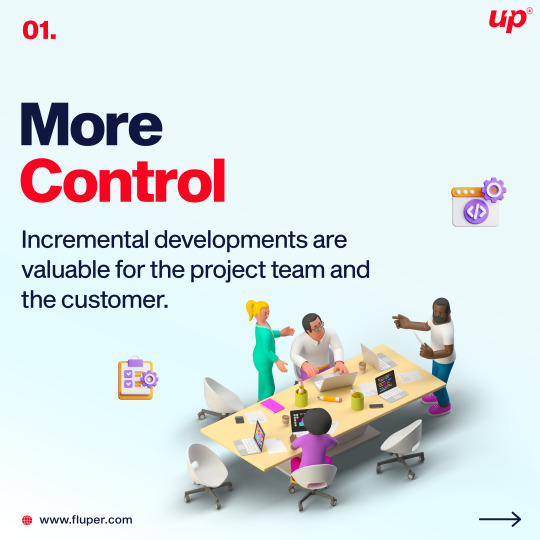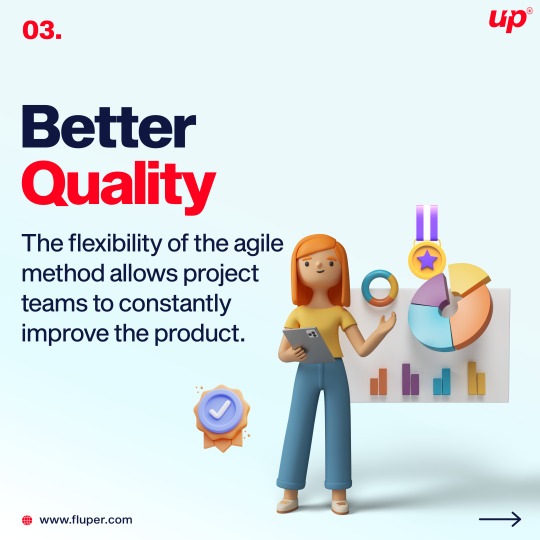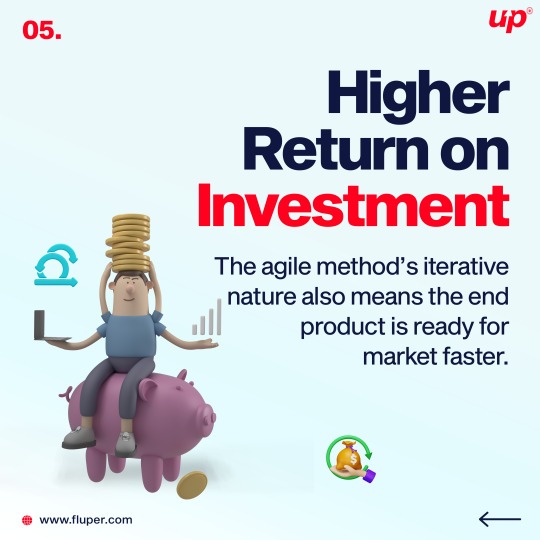#AgileProcess
Explore tagged Tumblr posts
Text
Agile Testing for Faster, Smarter Software Delivery
In today's fast-paced digital world, there is a competitive requirement for the quick delivery of high-quality software products. Most traditional testing methodologies do not allow companies to meet the demand for quick development cycles. Our Agile Testing practices at GQAT Technologies enable companies to deliver high-performing software that meets user needs without compromising delivery speed. In short, we perform testing activities naturally throughout the Agile delivery framework, allowing for high-quality deliverables. Here's how our Agile Testing provides a smarter, faster delivery of software.
What is Agile Testing?
Agile Testing is a collaborative testing approach that reflects the Agile philosophy and is wholly different from traditional software testing methodologies, using waterfall methodologies where testing occurs only at the end development life cycle. Quality assurance (QA) is baked into every step of the Agile software development process. Agile testing teams consist of testers, developers, and stakeholders who work collaboratively in modular and iterative development cycles, allowing for functional validation, defect identification, and adjustments to accommodate changes in user stories or requirements.
GQAT Technologies Agile Testing services, summarized in our Agile Testing page, focus on continuous feedback with each new version of software that is developed, allowing the software to satisfy users' needs while keeping pace with Agile's rapid iterations.
GQAT’s Agile Testing Approach
At GQAT Technologies, we tailor our Agile Testing services to meet your unique project needs, ensuring they align seamlessly with your development methodology. Our testing approach is comprised of proven methodologies and tools that deliver results that can be measured. Here is how we do it:
1. Continuous Testing in Sprints
We introduce testing throughout every sprint, including validating features while they are being developed. Our testers engage directly with developers to create testing cases from the developed user stories to ensure that the functionality meets business objectives. We also automate repetitive testing to provide the maximum available time for exploratory testing and to pick up edge cases that can impact user experience with something such as the user interface.
2. Test Automation to Keep Pace and Scale
Automation is fundamental to our Agile Testing framework; we automate tests for functional, regression, and performance testing using tools such as Selenium, Appium, and JUnit. Automation performs the tedious testing for functional, regression, and performance testing and frees up resources to maximize development with pace and scalability. Automation allows for faster feedback to the development team and ensures that quality remains consistent with less than 60% of manual effort. For example, in the past, one of our clients was getting a 50% reduced testing time when they adapted our automation framework.
3. Shift-Left Testing
We believe testing sooner rather than later allows for capturing defects as they happen. In short, incorporating testers in the requirements and design phases prevents costly rework. Shift-left testing reduces defect resolution costs by 30–50% because the defect is resolved when it is less complicated to fix.
4. Cross-Functional Teams
Our Agile Testing teams are aligned with developers, product owners (POs), and DevOps engineers. We hold daily standup meetings, sprint retrospectives, and use collaborative tools like Jira and Confluence to keep everyone aligned. Our teams share the responsibility for quality, so the work is not an afterthought.
5. Comprehensive Test Types
The Agile Testing team executes all test types to deliver a seamless product:
Functional Testing: To ensure features function as expected.
Regression Testing: Ensure new changes do not break previous core functionality.
Performance Testing: Take a look to see if your software 'performs' under load.
Usability Testing: Testing and looking to make sure the user's experience is seamless.
Security Testing: Given the current threat landscape, testing to ensure there are no vulnerabilities.
6. Data-Driven/Key Performance Indicators (KPIs)
Using various KPIs (defect density, test coverage, cycle time), metrics/dashboards to illustrate progress, and reporting structures to increase transparency, we believe this drives great potential for improvement. You will be continuously updated with reports that illustrate status and allow you to have confidence in the quality of your software.
The GQAT Difference
At GQAT Technologies, we take pride in our commitment to quality and our adaptability. Our Agile Testing services can be integrated naturally into your workflows, where Scrum, Kanban, or a mixture of both is being used. This is why clients are choosing us:
Experience: Our testers are certified, experienced in Agile methodologies and the latest QA tools.
Customized: If you're not sure how we can apply our Agile Testing approach to your area, laboratory, fintech, e-commerce, it's okay - we will work with your industry to create a customized solution.
Scale: Our Agile Testing processes can expand to suit your project, scaling from startup to enterprise.
Results: A client in the retail sector recently reduced their release cycle by 40%, with stable software, while working with us, providing Agile Testing services.
Real-World Results
Our Agile Testing services have changed the way businesses deliver software, no matter their organizational type. For example, a fintech client eliminated time delays in the release cycle of their payment platform, thanks to our automated testing suite, our client was able to achieve 99.9% defect-free deployments. We also documented a healthcare client who achieved a 25% increase in user satisfaction score for a new mobile app through iterative usability testing. These stories demonstrate the value of Agile Testing when done correctly.
The Future of Software Quality
As software development continues to accelerate, Agile Testing will remain a key component of quality. New trends in AI testing, DevOps, and continuous delivery mean that GQAT Technologies will be focused on looking into the future and continuing to ensure our Agile Testing services are ahead of the game. And because Agile Testing is not a static practice, we can make sure that your development will be relevant in the future.
Get Started with GQAT Technologies
Are you ready to get continuous, reliable, user-centric, high-quality software deployed in days instead of months? If so, GQAT Technologies' Agile Testing services are your first stop for an uninterrupted delivery process. Whether you are productizing a new or existing application, we can assist you with your quality assurance as a service needs. Contact GQAT Technologies today to arrange a free consultation. We can't wait to show you how Agile Testing can help you get your software to happy users!
#AgileTesting#QAinAgile#AgileQA#SoftwareTesting#AgileDevelopment#TestAutomation#SprintTesting#ContinuousTesting#ScrumQA#DevOpsTesting#AgileProcess#QualityAssurance#GQATTech#ProductQuality#BugFreeDelivery
0 notes
Text
#IterativeDevelopment#AgileDevelopment#SoftwareDevelopment#ProductDevelopment#TechInnovation#AgileProcess#MVPStrategy#DigitalProductDesign#SoftwareEngineering#UserDrivenDevelopment
0 notes
Text
Stamens Software is an Outstanding Team to Work With.

At Stamens, we don’t just build software — we craft custom digital solutions that solve real problems and drive measurable results. Whether you're a startup or an enterprise, we blend creativity, strategy, and technology to take your business to the next level.
As a leading Custom Software Development Company, we pride ourselves on delivering tailor-made solutions designed to meet your unique business needs. From user-centric design to agile development, our team ensures your product is not only functional but future-proof.
We specialize in: ✅ Custom Web & Mobile Applications ✅ Cloud-Based Solutions ✅ Ongoing Website Maintenance & Support
💼 Your success is our priority. Partner with a trusted Custom Software Development Company in Noida and experience seamless digital transformation backed by innovation and expertise.
📍 Visit us at: B-33, Sector-6, Noida, UP 📞 Call us: +91 120 3500 847 📧 Email us: [email protected] 🌐 Explore more: www.stamenssoftware.com
Let’s turn your ideas into impactful digital products. 🌟
#StamensSoftware#SoftwareDevelopment#DigitalTransformation#CustomSolutions#CloudTechnology#AgileProcess#WebDevelopment#AppDesign#TechExperts#InnovateWithUs#UserFirstDesign#IndianTech#ITSupport#NoidaTech#FutureDrivenTech#CustomSoftwareDevelopmentCompany#CustomSoftwareDevelopmentCompanyInNoida
0 notes
Text

🚀 Boost Your Career with Agile Scrum Foundation Certification Training! 🚀
Are you a software developer, project manager, or IT professional looking to enhance your skills in Agile project management and Scrum frameworks? Upgrade My Skill's Agile Scrum Foundation Certification Training is your perfect gateway to understanding Agile principles and Scrum practices.
📚 What You'll Learn:
Key concepts of Agile methodologies. Scrum roles, events, and artifacts. Agile planning, estimating, and continuous improvement techniques. Practical applications of Agile tools and best practices. This entry-level course is designed to prepare you for the Agile Scrum Foundation (ASF) Certification Exam. Delivered in both classroom and live online modes, it's accessible to professionals worldwide.
✅ Why Get Certified?
Increase Career Opportunities: Stand out with a globally recognized credential. Boost Earning Potential: Agile expertise is in high demand across industries. Lead Successful Projects: Master the tools and techniques to drive iterative progress and enhance team performance. Get ready to elevate your career and become an Agile expert with Upgrade My Skill!
👉 Enroll Now: https://www.upgrademyskill.com/agile-scrum-foundation-certification-training
#AgileScrum#ScrumCertification#ProjectManagement#UpgradeYourSkills#AgileTraining#careerdevelopment#AgileMethodology#ScrumMaster#AgileProjectManagement#AgileCertified#ScrumTraining#ProfessionalDevelopment#AgileCertification#ProjectManagementTraining#AgileScrumFoundation#ScrumPractices#ITProfessionals#SoftwareDevelopment#AgileCoaching#ScrumMasterCertification#AgileTeams#ContinuousImprovement#CareerGrowth#ITTraining#AgileSkills#AgileProcess#ScrumRoles#UpgradeMySkill#CertificationTraining#AgileExperts
0 notes
Text

0 notes
Text
#BusinessProcessManagement#BPMS#ProcessAutomation#WorkflowOptimization#BusinessAutomation#DigitalTransformation#TechInnovation#BusinessTechnology#ProcessInnovation#AgileProcesses#EnterpriseSolutions#BusinessEfficiency#OperationalExcellence#IntelligentAutomation#RPA (Robotic Process Automation)#GlobalBusinessSolutions#EmergingMarkets#TechAdoption#SaaSPlatforms#FutureOfWork
0 notes
Text
Agile Evolution: Adapting Sprint Management for Changing Needs
In the fast-paced world of project management, the evolution of agile methodologies has become imperative to keep pace with changing needs and dynamic environments. One such evolution is the adaptation of sprint management, a key component of agile frameworks, to suit the ever-changing demands of modern projects. In this blog post, we will explore the concept of agile evolution and dive into how organizations can effectively adapt sprint management to meet their evolving needs.
Understanding Agile Evolution
Agile methodologies originated from the software development industry, emphasizing iterative development, collaboration, and flexibility. Over time, agile principles have transcended their original domain and found application in various industries, including marketing, finance, and manufacturing. This evolution reflects the need for organizations to respond quickly to market changes, customer feedback, and technological advancements.
The Role of Sprint Management
At the heart of agile methodologies lies sprint management, a framework for breaking down projects into manageable chunks called sprints or iterations. Each sprint typically lasts two to four weeks and involves planning, execution, review, and adaptation. Sprint management promotes transparency, collaboration, and continuous improvement, enabling teams to deliver value incrementally and respond to changes effectively.
Challenges in Adapting Sprint Management
While sprint management offers numerous benefits, adapting it to changing needs poses several challenges. These challenges include:
Scope Creep: Changes in project scope during sprints can disrupt timelines and priorities.
Resource Constraints: Limited resources may hinder the ability to adapt quickly to evolving requirements.
Communication Breakdowns: Inadequate communication among team members can lead to misunderstandings and delays.
Resistance to Change: Resistance from team members or stakeholders may impede the adoption of new practices.
Strategies for Adapting Sprint Management
To overcome these challenges and successfully adapt sprint management for changing needs, organizations can implement the following strategies:
Prioritize Flexibility: Embrace change as a core principle of agile methodologies. Encourage teams to remain flexible and responsive to evolving requirements.
Effective Planning: Determine precise objectives, outputs, and standards for evaluation in each sprint.Define clear objectives, deliverables, and success criteria for each sprint.
Regular Communication: Foster open and transparent communication among team members, stakeholders, and customers. Regularly review progress, solicit feedback, and address concerns promptly.
Empowerment and Accountability: Empower team members to take ownership of their work and make decisions autonomously. Establish accountability mechanisms to ensure that commitments are met.
Continuous Improvement: Embrace a culture of continuous improvement by regularly reflecting on processes, identifying areas for enhancement, and implementing changes iteratively.
Conclusion
In conclusion, agile evolution is essential for organizations seeking to thrive in today’s dynamic business landscape. By adapting sprint management for changing needs, organizations can enhance their agility, responsiveness, and ability to deliver value to customers. By prioritizing flexibility, effective planning, communication, empowerment, and continuous improvement, organizations can overcome challenges and unlock the full potential of agile methodologies.
As the pace of change continues to accelerate, embracing agile evolution becomes not just a competitive advantage, but a necessity for survival in the ever-evolving marketplace.
#artificial intelligence#projectmanagement#marketing#SprintManagement#AgileWorkflow#ProjectManagement#Scrum#TeamProductivity#AgileMethodology#ProductDevelopment#TimeManagement#TaskPrioritization#CollaborativeTeams#AgileLeadership#TaskManagement#TeamCoordination#IterativeDevelopment#ContinuousImprovement#AgileProcesses#ProjectPlanning#TeamEmpowerment#SprintPlanning
0 notes
Text
youtube
Discover the 10-step process for transforming from Waterfall to Agile in any organization! Learn how to customize these steps to suit your organization's needs and project types, enabling a smooth transition from traditional methodologies to Agile practices. Subscribe for more insights into Agile transformation and best practices. #AgileTransformation #WaterfallToAgile #AgileProcess
#acceptancecriteriainuserstories#acceptancecriteriaexamples#acceptancecriteriaagile#acceptancecriteriainagile#acceptancecriteriainscrum#acceptancecriteriainterviewquestion#acceptancecriteriainagilescrum#acceptancecriteriavsdefinitionofdone#acceptancecriteriaanddefinitionofdoneinagile#acceptancecriteria#Youtube
0 notes
Text
The Powerful Synergy of DevOps and Agile Methodologies DevOps and Agile methodologies form a potent alliance, fostering seamless collaboration between development and operations teams. By embracing iterative approaches and continuous integration, they drive faster, more efficient software delivery, enabling organizations to respond adeptly to evolving market demands. . . ➡️Check out the post to learn more about them. ➡️Let us know if you want to know more points in the comment section below 👉Do not forget to share with someone whom it is needed. 👉Let us know your opinion in the comment down below 👉Follow @Zoof Software Solutions for more information ➡Grow your business with us! . . ✔️Feel free to ask any query at [email protected] ✔️For more detail visit: https://zoof.co.in/
#agilemethodology#AgileProductivity#Agile#AgileDevelopment#AgileSoftwareDevelopment#devops#agileworking#aws#programming#cloudcomputing#projectmanagement#scrumteam#agileculture#scrumframework#agileprocess#cloud#agiletransformation#SoftwareCompany#StartUpTechnology#mobilefriendlywebsite#GrowBusiness#WebsiteDevelopment#SoftwareConsultant#ZoofSoftwareSolutions#zoof#zoofinc#MobileAppDevelopment#AwardWinningCompany#BestSoftwareCompany#digitalmarketing
0 notes
Text

The #AgileProductDevelopmentProcess is a popular methodology for developing products in a quick and efficient manner. This process is based on the Agile principles of iterative development, constant feedback, and customer involvement. The Agile process has been proven to be successful in developing high-quality products in a shorter time frame than traditional development processes.
#AgileSoftwares#AgileProductDevelopment#AgileManifesto#AgileModel#AgileProcess#AgileDevelopmentMethodology#AgileSoftwareDevelopmentLifeCycle#AgileSdlc#SafeAgileMethodology#ExtremeProgramming#AgileDevops#AgileandDevops#AgileMethodologyProcess#AgileDevelopmentModel#AgileProductDevelopmentProcess
0 notes
Audio
For improving business outcomes, organisations are following a myriad of methodologies. It may appear to be abnormal yet a feeling of competition between advocates of the waterfall and Agile is an ever ending discussion.
0 notes
Text

Agile Software Development is a set of methods and practices where solutions evolve through collaboration between self-organizing, cross-functional teams.
Check the Agile process model to deliver successful systems quickly - https://www.digital-web-services.com/key-forms-of-agile-software-development-approach.html
0 notes
Photo

Frequent Value Delivery in Agile Process is making its way due to its quick and solid benefits. Learn about its six reasons that are really significant.
#AgileProcess#FrequentValueDelivery#CPM#certifiedprojectmanager#certifiedprojectmanagercertification#CPMcertification#ICPMGlobal#agile#agileworking#agiledevelopment#agilework
0 notes
Text

#devopsplatform#it services#devsecopsaccelerator#agile project management#agilemarketing#agiledevops#agiletransformation#digitaltransformation#development#software#consulting#agileprocesses
0 notes
Text
"Simplified Agile Methodology: Streamlining Software Development"






Agile methodology is out of the way to manage things and get the project to successful results with perfection.
@fluper is a leading software development company presenting the most seamless and on-time project delivery experiences.
#mobileappdevelopment#android#iosappdevelopment#androidappdevelopment#technology#appdevelopmentcompany#mobileappdevelopers#fluper#business#ios#agile project management#agilesoftwaredevelopment#agileprocesses
0 notes